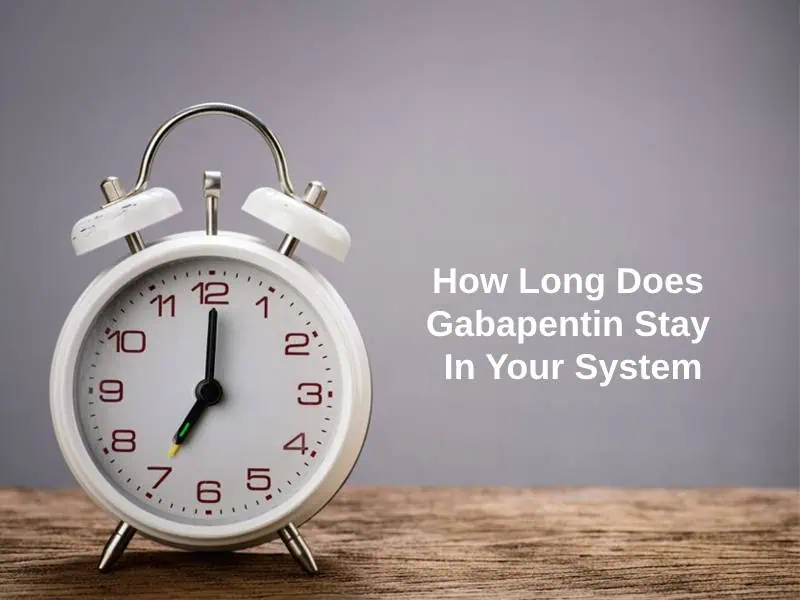Exact Answer: 48 hours (Approximately)
Many drugs are in use for medicinal purposes, and gabapentin is one among them. Gabapentin is also known as an antiepileptic drug and is an anticonvulsant. Gabapentin is bought in use in seizures in children and adults and pain in damaged nerves. Its work is to relieve nerve pain and also control seizures by affecting the chemicals and nerves involved.
Every Neurontin capsule contains about 300 to 400 mg of gabapentin. Gabapentin’s chemical structure is derived when a cyclohexyl group gets added to the backbone of gamma-aminobutyric acid. The gabapentin capsules contain active and inactive ingredients. It is a belief that gabapentin mimics gamma-aminobutyric acid (GABA), a neurotransmitter in the brain.

How Long Does Gabapentin Stay In Your System?
Gabapentin stays in our system for about 48 hours. It takes around two days to get eliminated from the body. The half-life of gabapentin is nearly seven hours. However, the half-life may differ from person to person depending on some factors. It is considered a safe drug for medicinal purposes and not for recreational purposes.
Gabapentin is helpful in the treatment of many health problems. Some of the situations of gabapentin use are restless leg syndrome, anxiety, pain not relating to nerve issues, etc. After the treatment starts, gabapentin takes around one to two weeks to start showing its effects. However, the period may increase or decrease, varying according to the situation and person.
The standard dosage of gabapentin is between 1800 mg to 3600 mg in a day. The daily requirement of dosage is filled by dividing it into three doses implies three times a day. Even gabapentin is a safer drug but not to be taken without a doctor’s prescription. The concentration of gabapentin is at its peak in our body after two to three hours after swallowing it.
Intake of Gabapentin is through the mouth. It needs to be swallowed and not be crushed or chewed. If chewed or crushed, the whole drug gets released at once, causing some side effects. Gradually, the treatment increases or decreases based upon the condition. Different tests are helping detect the presence of gabapentin in the body.
| How long does gabapentin | Duration |
| stay in your system | about 48 hours |
| half-life | five to seven hours |
| at peak | after 2 to 3 hours |
| is detectable in blood tests | five to seven hours |
| is detectable in urine tests | up to 3 days |
| is detectable in hair tests | for up to 90 days |
Why Does Gabapentin Stay In Your System For So Long?
Gabapentin stays in your system for two days, that is forty-eight hours. It is a non-addictive drug. It does not affect the receptors in the brain but, it reduces the activities of other neurons. Gabapentin is available in two forms which are immediate-release and in an extended-release form. The metabolization of gabapentin does not take place in the liver. It gets metabolized by kidneys and eliminated by renal excretion.
Gabapentin is, however, eliminated faster as compared to other drugs due to its metabolization process. How faster the gabapentin eliminates from the system depends on some factors. The factors are the quantity of the drug, age of the person, weight, and the functionality of the kidneys. Like the extended-release form of gabapentin takes longer to get eliminated than the immediate-release version. Gabapentin does get metabolized in humans readily or fully. It is not a protein-bound drug.
As the age increases, the period gets longer for gabapentin removal. Adequate hydration helps the removal of gabapentin because it gets metabolized in the kidney. Like every coin, along with its advantages, gabapentin has some side effects too. Some of the side effects are back pain, dizziness, fatigue, depression, muscle pain, double vision, etc.
Conclusion
Gabapentin is an anticonvulsant and non-addictive drug. It is one of the fewer drugs that does not metabolize in the liver. It gets absorbed in a limited area of the small intestine and metabolized in the kidneys. A person with chronic kidney disease stage 3B, stage 4, stage 5 should avoid intake of gabapentin or would reduce the functionality of the kidneys. Also, aluminum and magnesium should not be taken 2 hours before gabapentin intake or lead to some health problems.